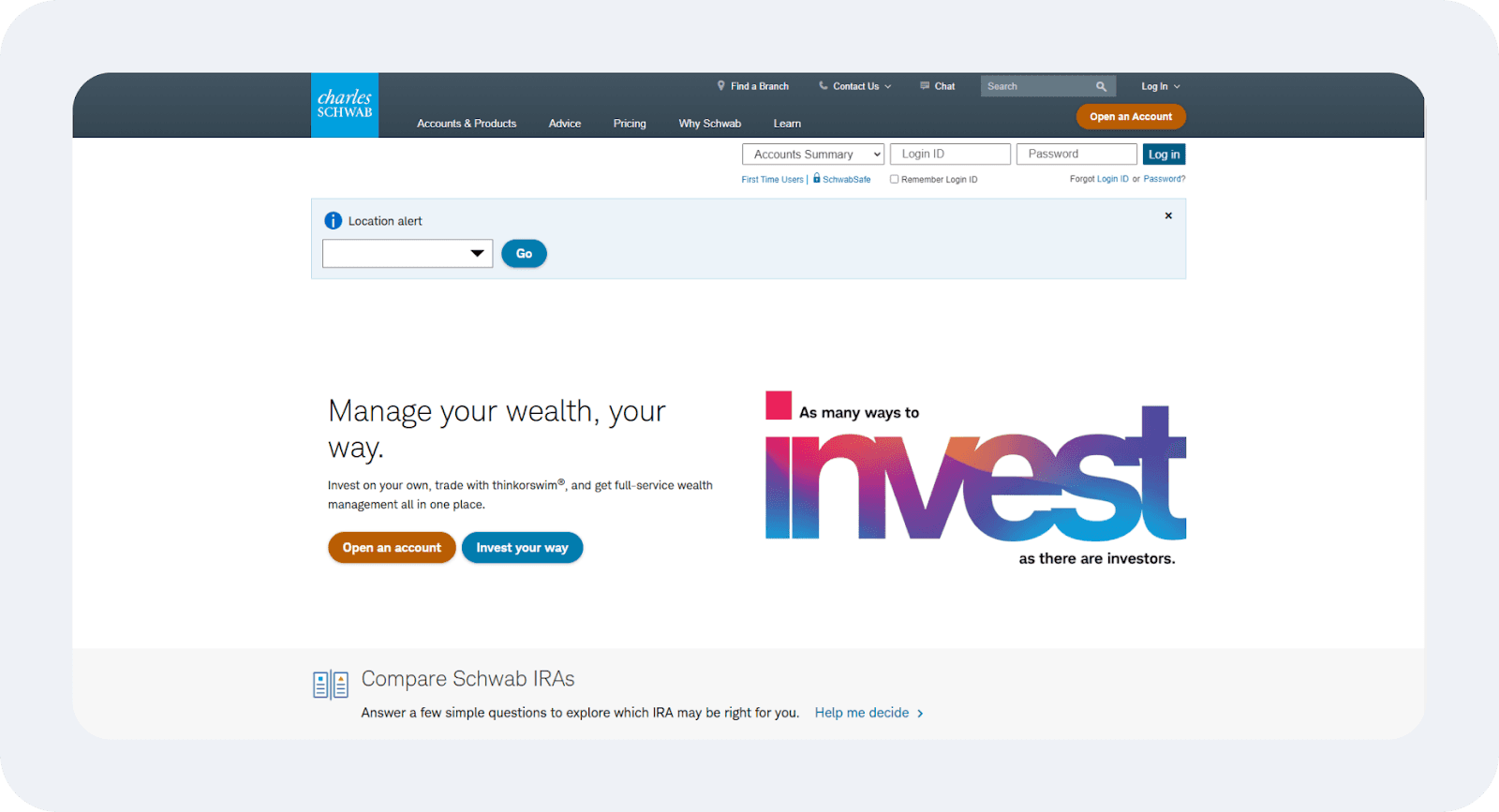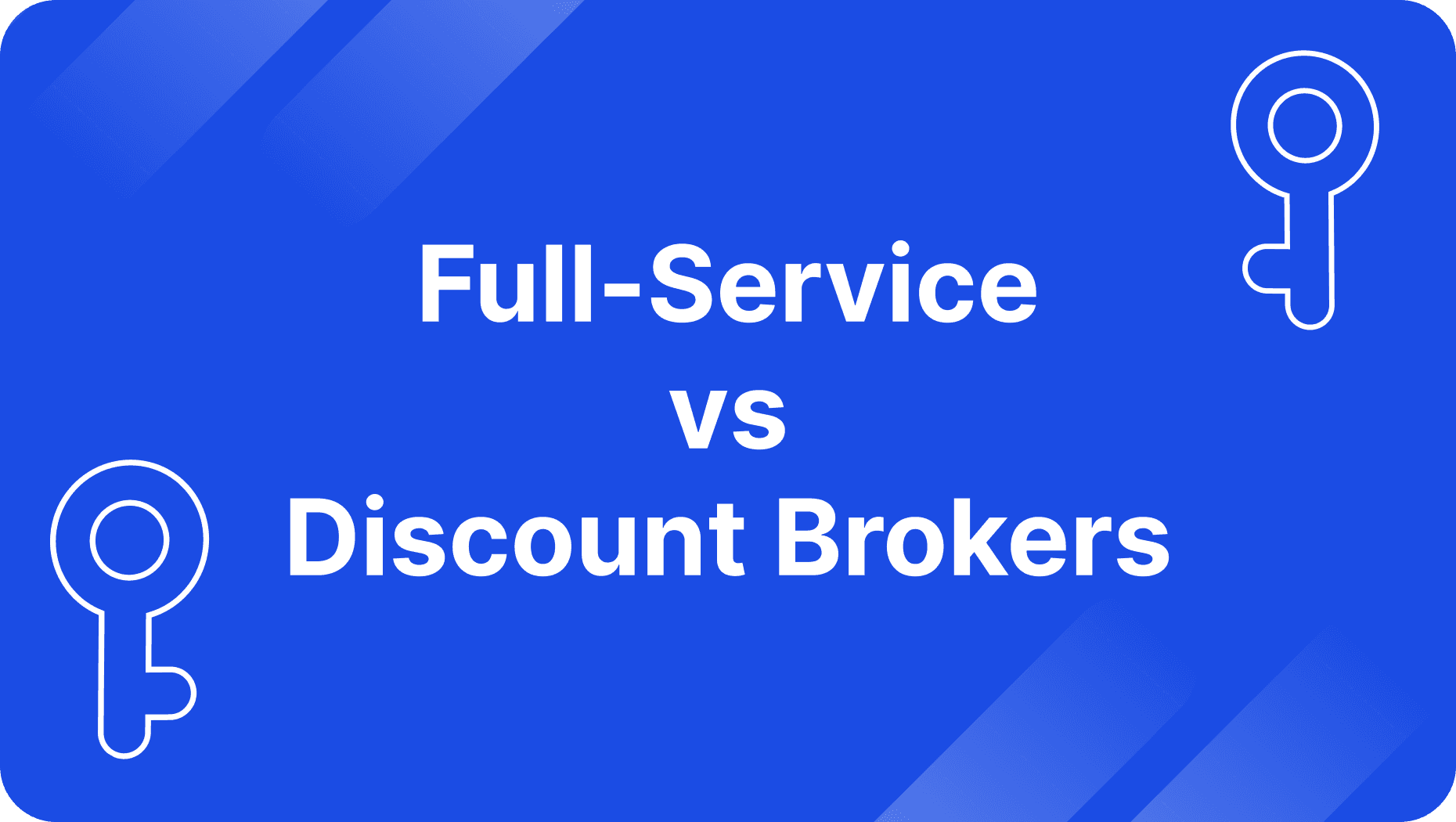مشاركة
0
/5
(
0
)
بدء رحلتك في عالم الاستثمار يبدأ بقرار أساسي: اختيار الوسيط المناسب. إن الاختيار بين وسيط الخدمة الكاملة والوسيط منخفض التكلفة هو أكثر من مجرد اعتبار مالي — فهو يُحدد كيفية تواصلك مع استثماراتك، إدارة وقتك، وسعيك لتحقيق أهدافك المالية.
هل تفضل الحصول على إرشاد مباشر واستراتيجيات مصممة خصيصاً لك، أم أنك تبرع في التداول المستقل الفعال من حيث التكلفة؟
سواء كنت مبتدئاً يبحث عن نصائح الخبراء أو مستثمراً متمرساً يسعى لتقليل التكاليف، فإن فهم نوع الوسيط الذي يتناسب مع احتياجاتك يمكن أن يؤثر بشكل كبير على مسار رحلتك الاستثمارية.
سيوضح هذا المقال نموذجين من نماذج الوساطة الأكثر شيوعاً — وسيط الخدمة الكاملة والوسيط منخفض التكلفة — وسيساعدك على فهم الفروقات الرئيسية بينهما.
النقاط الرئيسية
يوفر وسيط الخدمة الكاملة نصائح مالية مخصصة والوصول إلى فرص حصرية مثل الاكتتابات الأولية والأسواق الأجنبية.
على النقيض من ذلك، يقدم الوسطاء منخفضو التكلفة تداولاً منخفض التكلفة ومستقلاً، مع أدوات أساسية لإدارة الاستثمارات دون تقديم نصائح مخصصة أو خدمات شاملة.
بينما تكون تكاليف الوسطاء منخفضي التكلفة أقل، فإنهم عادةً ما يستهدفون من يفضلون إدارة محافظهم بأنفسهم.
ما هو وسيط الخدمة الكاملة؟
يُعد وسيط الخدمة الكاملة وسيطاً مالياً يقدم للعملاء مجموعة واسعة من الخدمات تتجاوز مجرد تنفيذ الصفقات. وتشمل هذه الخدمات عادةً النصائح الاستثمارية المخصصة، وإدارة المحافظ، والبحوث والتحليلات السوقية، والتخطيط للتقاعد، وغيرها.
غالباً ما يستهدف وسطاء الخدمة الكاملة الأفراد الذين يبحثون عن إرشاد مهني لاتخاذ قرارات مالية مدروسة. وقد يقدمون أيضاً خدمات متخصصة مثل التخطيط الضريبي، وتخطيط التركات، والوصول إلى استراتيجيات استثمارية رفيعة المستوى مصممة للأفراد ذوي الثروات الكبيرة أو لأولئك الذين لديهم احتياجات مالية معقدة.
على عكس الوسطاء منخفضي التكلفة الذين يركزون بشكل أساسي على توفير منصات تداول منخفضة التكلفة للمستثمرين المستقلين، يتميز وسطاء الخدمة الكاملة بتعاملهم العملي والقريب مع العملاء لتخصيص الحلول بما يتناسب مع أهدافهم الخاصة. على سبيل المثال، قد يساعدون في اختيار الأسهم الفردية، الصناديق المشتركة، أو استثمارات أخرى تتماشى مع مدى تحمل العميل للمخاطر، وأفقه الزمني، وخطته المالية العامة.
تعود هذه المقاربة المخصصة بالفائدة على الأفراد الذين قد لا تتوفر لديهم الوقت أو الخبرة لإدارة استثماراتهم بأنفسهم، إذ يمكنهم الاعتماد على نصائح وخبرة الوسيط.
[aa quote-global]
معلومة سريعة
غالباً ما يقوم الوسطاء منخفضو التكلفة بإلغاء العمولات على تداول الأسهم والصناديق المتداولة بالبورصة (ETF)، مما يجعلها خياراً فعالاً من حيث التكلفة للمتداولين المتكررين.
[/aa]
الخدمات التي يقدمها وسطاء الخدمة الكاملة
يوفر وسيط الخدمة الكاملة مجموعة شاملة من الخدمات تتجاوز تنفيذ الصفقات فقط. صممت هذه الخدمات لمساعدة المستثمرين على تحقيق أهدافهم المالية من خلال النصائح المخصصة، والإرشاد المتخصص، والوصول إلى أدوات مالية متخصصة. فيما يلي بعض الخدمات الرئيسية التي يقدمها وسطاء الخدمة الكاملة:
النصائح الاستثمارية المخصصة
يقدم وسطاء الخدمة الكاملة توصيات استثمارية مصممة خصيصاً بناءً على الوضع المالي الفريد للعميل، وأهدافه، وقدرته على تحمل المخاطر. ويشمل ذلك النصائح حول تخصيص الأصول، واختيار الأسهم، واستراتيجيات التنويع.
إدارة المحافظ
يقدم وسطاء الخدمة الكاملة إدارة مستمرة للمحافظ، بما في ذلك إعادة توازن الاستثمارات ومتابعة الأداء. وهم يضمنون توافق محفظة العميل مع أهدافه المالية طويلة الأجل ويقومون بتعديلها حسب الحاجة استجابةً لظروف السوق.
البحوث والتحليل السوقي
يقدم وسطاء الخدمة الكاملة تقارير بحوث معمقة وتحليلات سوقية، مما يساعد العملاء على البقاء على اطلاع باتجاهات السوق، والبيانات الاقتصادية، وفرص الاستثمار المحتملة. ويمكن أن تشمل هذه البحوث الأسهم الفردية والقطاعات وحركات السوق الأوسع.
التخطيط للتقاعد
يساعد هؤلاء الوسطاء العملاء في التخطيط للتقاعد عن طريق إنشاء استراتيجيات لضمان الأمان المالي على المدى الطويل. ويقدمون النصائح حول حسابات التقاعد مثل حسابات التقاعد الفردية (IRAs)، وخطط 401(k)، وغيرها من وسائل التقاعد، ويساعدون العملاء في إدارة مدخراتهم التقاعدية لتعظيم العوائد المستقبلية.
التخطيط الضريبي والإرشاد
غالباً ما يقدم وسطاء الخدمة الكاملة خدمات متعلقة بالضرائب، حيث يقدمون المشورة للعملاء حول كيفية هيكلة استثماراتهم لتقليل الالتزامات الضريبية. كما قد يقدمون إرشادات حول استراتيجيات الاستثمار الفعالة ضريبياً ويساعدون في استغلال خسائر الضرائب.
تخطيط التركات
يقدم وسطاء الخدمة الكاملة خدمات تساعد العملاء على التخطيط لتوزيع ثرواتهم بعد الوفاة. ويشمل ذلك إعداد الوصايا، وإنشاء الصناديق الائتمانية، وغيرها من الأدوات القانونية لضمان انتقال أصول العملاء وفقاً لرغباتهم.
الوصول إلى فرص استثمارية حصرية
غالباً ما يتيح وسطاء الخدمة الكاملة للعملاء الوصول إلى خيارات استثمارية غير متاحة عبر الوسطاء منخفضي التكلفة، مثل الأسهم الخاصة، وصناديق التحوط، أو استثمارات بديلة أخرى. وقد تتطلب هذه الفرص استثمارات أولية أعلى أو معرفة متخصصة.
التخطيط المالي وإدارة الثروات
يقدم العديد من وسطاء الخدمة الكاملة تخطيطاً مالياً شاملاً يشمل إعداد الميزانيات، وإدارة الديون، وتخطيط التأمين، وغيرها. وهم يعملون مع العملاء لوضع خطة شاملة لإدارة ثرواتهم، بدءاً من الإنفاق اليومي وحتى الادخار طويل الأجل واستراتيجيات الاستثمار.
التعليم المالي والإرشاد
غالباً ما يقدم وسطاء الخدمة الكاملة موارد تعليمية، وندوات، أو جلسات فردية لمساعدة العملاء على فهم استثماراتهم والأسواق المالية بشكل أفضل. ويمكن أن يكون هذا مفيداً بشكل خاص للمبتدئين في الاستثمار أو لأولئك الذين يرغبون في تعميق معرفتهم.
مراجعات الحساب المنتظمة
عادةً ما يقوم وسطاء الخدمة الكاملة بمراجعة حسابات العملاء بانتظام لضمان أن استثماراتهم تسير على المسار الصحيح لتحقيق أهدافهم. وتتيح هذه المراجعات فرصة لمناقشة الأداء، وضبط الاستراتيجيات، وإجراء التعديلات اللازمة.
أمثلة على وسطاء الخدمة الكاملة
تعد العديد من المؤسسات المالية الراسخة أمثلة على وسطاء الخدمة الكاملة. تقدم هذه الشركات مجموعة واسعة من الخدمات الاستثمارية ونصائح مالية مخصصة. وهي تخدم كل من المستثمرين الأفراد والأشخاص ذوي الثروات الكبيرة، مقدمةً إرشاداً متخصصاً، وإدارة شاملة للمحافظ، والوصول إلى فرص استثمارية حصرية.
بعض من أبرز أمثلة وسطاء الخدمة الكاملة تشمل:
Merrill Lynch

Merrill Lynch يُعد واحداً من أبرز الأسماء في صناعة الوساطة للخدمات الشاملة. كقسم من بنك أوف أمريكا، يقدم ميريل لينش مجموعة واسعة من الخدمات المالية، بما في ذلك إدارة الثروات، والتخطيط للتقاعد، والاستشارات الاستثمارية، وتخطيط التركات. يستفيد العملاء من النصائح المالية المخصصة التي تتماشى مع أهدافهم، فضلاً عن فريق من المتخصصين المكرسين لإدارة محافظهم.
تتيح القدرات الواسعة للبحوث والتحليل في ميريل لينش للعملاء الوصول إلى تقارير معمقة حول اتجاهات السوق والأوراق المالية الفردية. ومع تواجده العالمي وتاريخه في خدمة المستثمرين الأفراد والمؤسسات، يظل ميريل لينش خياراً رائداً لأولئك الباحثين عن خدمات مالية شاملة.
Morgan Stanley

Morgan Stanley يُعد لاعباً رئيسياً آخر في صناعة الوساطة للخدمات الشاملة. معروف بخدماته في إدارة الاستثمارات، وإدارة الثروات، والتخطيط المالي، يوفر مورغان ستانلي للعملاء استراتيجيات رفيعة المستوى لتنمية وحماية ثرواتهم. كما يقدم نصائح مالية مخصصة تلبي مجموعة واسعة من الاحتياجات، بما في ذلك التخطيط الضريبي، والتخطيط للتقاعد، وإدارة التركات.
كما يوفر مورغان ستانلي الوصول إلى خيارات استثمارية متنوعة، بدءاً من الأسهم والسندات وصولاً إلى الأسهم الخاصة وصناديق التحوط. ومع تركيزه على خلق الثروة على المدى الطويل، فإن خبرة مورغان ستانلي ذات قيمة خاصة للعملاء الذين يمتلكون محافظ مالية معقدة أو لأولئك الذين يحتاجون إلى استراتيجيات استثمار متخصصة.
Edward Jones

Edward Jones هو وسيط خدمات شاملة معروف يقدم للمستثمرين الأفراد نهجاً أكثر محلية وشخصية. معروف بنموذجه المعتمد على الفروع، يركز إدوارد جونز بشدة على بناء علاقات طويلة الأمد مع العملاء من خلال استشارات فردية مع المستشارين الماليين. يقدم هؤلاء المستشارون إرشادات حول الاستثمارات، والتقاعد، وتخطيط التركات، ويصممون استراتيجيات تلبي احتياجات العملاء.
يحظى إدوارد جونز بتقدير عالٍ لخدمة العملاء المتميزة. يجعل نهجه هذا خياراً شائعاً للمستثمرين الذين يفضلون التفاعل المباشر مع وسطاءهم. وبفضل تركيزه العميق على التواصل مع المجتمع والتخطيط المالي المخصص، يعد إدوارد جونز مثالياً لأولئك الذين يبحثون عن خدمة شخصية واهتمام فائق.
Charles Schwab

Charles Schwab قد يكون معروفاً على نطاق واسع بخدمات الوساطة منخفضة التكلفة، لكنه يقدم أيضاً إمكانيات خدمات شاملة من خلال Schwab Private Client، التي توفر للعملاء ذوي الثروات الكبيرة نصائح استثمارية مخصصة وخدمات إدارة ثروات شاملة.
تشمل عروض خدمات شواب الشاملة إدارة محافظ مصممة خصيصاً، واستراتيجيات ضريبية، وتخطيط التركات، والوصول إلى فرص استثمارية حصرية. وتجعله سمعته في تقديم خدمة عملاء ممتازة وموارده البحثية الواسعة خياراً ذا قيمة للمستثمرين الذين يبحثون عن نهج أكثر تفاعلاً لإدارة مستقبلهم المالي.
ما هو الوسيط منخفض التكلفة؟
الوسيط منخفض التكلفة هو نوع من شركات الوساطة التي تقدم نهجاً مبسطاً وفعالاً من حيث التكلفة للتداول والاستثمار. وعلى عكس وسطاء الخدمة الكاملة، يركز الوسطاء منخفضو التكلفة بشكل أساسي على تيسير الصفقات المستقلة للمستثمرين الذين يفضلون إدارة محافظهم بأنفسهم.
يقدم الوسطاء منخفضو التكلفة عمولات ورسوماً أقل بكثير، مما يجعلها خياراً جذاباً للأفراد الذين لا يحتاجون إلى خدمات استشارية شاملة أو استراتيجيات استثمار مخصصة. وعادةً ما يوفرون منصات إلكترونية حيث يمكن للمستثمرين تنفيذ الصفقات بسهولة في الأسهم، والسندات، والصناديق المشتركة، والصناديق المتداولة بالبورصة (ETFs)، وغيرها من الأدوات المالية.
شركات الوساطة منخفضة التكلفة تجذب المستثمرين الحريصين على تقليل التكاليف والذين يشعرون بالارتياح لاتخاذ قرارات بشأن شراء وبيع الأوراق المالية. ونظرًا لأن هؤلاء الوسطاء يركزون بشكل رئيسي على تنفيذ الصفقات، فإنهم لا يقدمون الخدمات الاستشارية الشاملة التي توفرها وسطاء الخدمة الكاملة.
بدلاً من ذلك، يقدم الوسطاء منخفضو التكلفة أدوات أساسية مثل الموارد التعليمية، وتقارير البحوث، والحاسبات الإلكترونية لمساعدة المستثمرين في اتخاذ قرارات مستنيرة. إن بساطتهم وتكلفتهم المعقولة تجعلهم يحظون بشعبية خاصة بين المستثمرين الأفراد، ومتداولي اليوم الواحد، والأجيال الشابة الذين يفضلون نهجاً عملياً في الاستثمار.
الخدمات التي يقدمها الوسطاء منخفضو التكلفة
يقدم الوسطاء منخفضو التكلفة خدمات مبسطة لتسهيل التداول بتكلفة منخفضة والاستثمار المستقل. وبينما لا يقدمون نصائح مالية مخصصة أو خدمات إدارة ثروات شاملة كما يفعل وسطاء الخدمة الكاملة، فإنهم يقدمون الأدوات والموارد الأساسية لمساعدة المستثمرين على تنفيذ استراتيجياتهم الاستثمارية بشكل مستقل.
فيما يلي بعض الخدمات الأساسية التي يقدمها الوسطاء منخفضو التكلفة:
التداول منخفض التكلفة
إحدى السمات الرئيسية للوسطاء منخفضي التكلفة هي تركيزهم على توفير تداول منخفض التكلفة أو بدون عمولات. وهذا يتيح للمستثمرين تداول الأسهم والسندات والصناديق المتداولة بالبورصة والأوراق المالية الأخرى بجزء بسيط من التكلفة مقارنة بوسطاء الخدمة الكاملة. فقد ألغى العديد من الوسطاء منخفضي التكلفة العمولات على تداول الأسهم والصناديق المتداولة بالبورصة، مما يجعلها في متناول المتداولين المتكررين أو أولئك الذين يرغبون في تقليل التكاليف.
منصات التداول الإلكترونية
عادةً ما يقدم الوسطاء منخفضو التكلفة منصات تداول إلكترونية سهلة الاستخدام للمستثمرين لوضع الصفقات، ومراقبة المحافظ، وتتبع الأسواق. تم تصميم هذه المنصات لتناسب المستثمرين المستقلين الذين يفضلون إدارة استثماراتهم بأنفسهم. وتأتي معظم المنصات مزودة بأدوات رسم بياني متقدمة، وبيانات سوقية فورية، وأنظمة إدارة الصفقات، مما يسهل تنفيذ الصفقات بسرعة وكفاءة.
تطبيقات الهاتف المحمول
يقدم العديد من الوسطاء منخفضي التكلفة تطبيقات للهواتف المحمولة تتيح للمستثمرين الوصول إلى حساباتهم ومنصات التداول. تتيح هذه التطبيقات للمستثمرين متابعة أداء محافظهم، وعرض الأسعار الفورية، وتنفيذ الصفقات من هواتفهم الذكية أو أجهزتهم اللوحية، مما يوفر لهم الراحة والمرونة.
البحوث الأساسية وبيانات السوق
غالباً ما يوفر الوسطاء منخفضو التكلفة الوصول إلى بيانات السوق الأساسية، وتقارير البحوث، والتحليلات لمساعدة المستثمرين على اتخاذ قرارات مستنيرة. وبينما قد لا تكون هذه الموارد معمقة أو مخصصة كما هو الحال لدى وسطاء الخدمة الكاملة، فإنها تتضمن عادةً أدوات فرز الأسهم، ورسوم بيانية لأسعار تاريخية، والبيانات المالية للشركات، وتعليقات سوقية يمكن أن توجه قرارات المستثمرين.
الموارد التعليمية
يقدم العديد من الوسطاء منخفضي التكلفة مواد تعليمية لمساعدة المستثمرين المبتدئين على فهم أساسيات الاستثمار والتداول. تتضمن هذه الموارد مقالات، وفيديوهات، وندوات عبر الإنترنت، ودروساً تعليمية تغطي إدارة المحافظ، والتحليل السوقي، واستراتيجيات الاستثمار، والمنتجات المالية. ويساعد ذلك المستثمرين على اتخاذ قرارات مستنيرة بشكل مستقل دون الاعتماد على مستشار مالي.
الصناديق المشتركة بدون رسوم
غالباً ما يوفر الوسطاء منخفضو التكلفة الوصول إلى الصناديق المشتركة بدون رسوم، التي تتيح للمستثمرين شراء الصناديق المشتركة دون دفع رسوم إضافية أو عمولات للوسيط. وبما أنه لا توجد رسوم بيع مرتبطة بهذه الصناديق، فإنها تُعتبر طريقة فعالة من حيث التكلفة للاستثمار في محفظة متنوعة.
خدمات الاستشارات الآلية (Robo-Advisory)
يقدم بعض الوسطاء منخفضي التكلفة أيضاً خدمات إدارة الاستثمارات الآلية، والمعروفة باسم المستشارين الآليين. تستخدم هذه الخدمات الخوارزميات لإنشاء وإدارة محافظ متنوعة للمستثمرين بناءً على مدى تحملهم للمخاطر وأهدافهم المالية. وتوفر الخدمات الاستشارية الآلية بديلاً منخفض التكلفة عن النصائح المالية التقليدية وهي مناسبة لأولئك الذين يرغبون في نهج غير تفاعلي للاستثمار.
حسابات التقاعد
يسمح العديد من الوسطاء منخفضي التكلفة للمستثمرين بفتح حسابات تقاعد، مثل الحسابات الفردية للتقاعد (IRAs) وحسابات Roth IRA. توفر هذه الحسابات مزايا ضريبية، كما يوفر الوسيط الأدوات اللازمة لإدارة الاستثمارات داخل الحساب، مثل اختيار الصناديق منخفضة التكلفة وإعادة توازن المحفظة حسب الحاجة.
إدارة الحساب الأساسية
يوفر الوسطاء منخفضو التكلفة عمومًا ميزات إدارة الحساب، مثل الوصول عبر الإنترنت لعرض الأرصدة، وسجلات المعاملات، وتقارير الأداء. يمكن للمستثمرين إدارة استثماراتهم بسهولة وتتبع تقدمهم نحو تحقيق أهدافهم المالية.
حسابات الهامش
غالباً ما يسمح الوسطاء منخفضو التكلفة للمستثمرين بفتح حسابات الهامش، التي تتيح لهم اقتراض الأموال لشراء الأوراق المالية باستخدام محفظتهم الحالية كضمان. ويمكن أن تكون هذه الخاصية جذابة للمستثمرين الأكثر خبرة الذين يرغبون في استغلال استثماراتهم لتحقيق عوائد محتملة أكبر، رغم أنها تنطوي على مخاطر متزايدة.
أمثلة على الوسطاء منخفضي التكلفة
يقدم العديد من الوسطاء منخفضي التكلفة المعروفين تداولاً منخفض التكلفة وأدوات أساسية لإدارة الاستثمارات. يخدم هؤلاء الوسطاء المستثمرين المستقلين الذين يفضلون تنفيذ صفقاتهم بأنفسهم وتجنب الرسوم الأعلى المرتبطة بوسطاء الخدمة الكاملة.
بعض الأمثلة البارزة على الوسطاء منخفضي التكلفة تشمل:
E*TRADE

ETRADE هو وسيط منخفض تكلفة معروف يقدم تداولات بدون عمولات للأسهم، والصناديق المتداولة بالبورصة، والخيارات. وتشتهر منصة إي*تريد بسهولة استخدامها وأدواتها الشاملة، بما في ذلك أدوات الرسم البياني المتقدمة، والبيانات السوقية الفورية، وأدوات الفرز.
يوفر الوسيط الوصول إلى استثمارات متنوعة، بما في ذلك الصناديق المشتركة والسندات. كما يقدم موارد تعليمية للمبتدئين وأدوات متطورة للمتداولين الأكثر خبرة. كما يقدم E*TRADE حسابات تقاعد وتداولاً بالهامش.
Fidelity

Fidelity هو وسيط منخفض تكلفة موثوق يقدم تداولات بدون عمولات للأسهم، والصناديق المتداولة بالبورصة، والخيارات. ويحظى بتقدير كبير لخدمة العملاء المتميزة وعروضه البحثية القوية، بما في ذلك أدوات الاستثمار، وتحليل الأسهم، والتعليقات السوقية.
كما توفر Fidelity الوصول إلى خيارات استثمارية متنوعة، بما في ذلك الصناديق المشتركة، والمنتجات ذات الدخل الثابت، وحسابات التقاعد. ويقدم الوسيط محتوى تعليمياً لجميع مستويات المستثمرين ويدعم أنواع الحسابات مثل IRAs وخطط 401(k).
Robinhood

Robinhood هي منصة تداول شعبية بدون عمولات، يفضلها بشكل خاص المستثمرون الشباب المطلعون على التكنولوجيا. يقدم Robinhood تداولات بدون عمولات للأسهم، والخيارات، والصناديق المتداولة بالبورصة، والعملات الرقمية.
تشتهر المنصة بواجهة بسيطة وبديهية، مما يجعلها سهلة الاستخدام للمبتدئين في بدء الاستثمار. وبينما يفتقر Robinhood إلى أدوات البحث المتقدمة المتوفرة لدى وسطاء منخفضي التكلفة الآخرين، فإن تركيزه على سهولة الاستخدام والتداول منخفض التكلفة يجعله خياراً جيداً للأفراد الذين يتطلعون إلى التداول بشكل متكرر مع رسوم قليلة.
أي وسيط هو الأنسب لك؟
يعتمد اختيار الوسيط المناسب على احتياجاتك الاستثمارية، وأهدافك، ومستوى خبرتك، ومدى مشاركتك في إدارة محفظتك. يتمتع كل من وسطاء الخدمة الكاملة والوسطاء منخفضي التكلفة بمزايا خاصة، وفهم هذه المزايا يمكن أن يساعدك في اتخاذ قرار مستنير.
فيما يلي تحليل يوضح أي وسيط قد يكون الأنسب لك بناءً على عوامل مختلفة:
مستوى الخبرة
قد يكون وسيط الخدمة الكاملة الخيار المناسب إذا كنت مستثمراً مبتدئاً أو تفتقر إلى الوقت أو الخبرة لإدارة استثماراتك بنشاط. يقدم وسطاء الخدمة الكاملة نصائح مخصصة، وتخطيطاً مالياً شاملاً، ودعماً مستمراً، وهو ما يمكن أن يكون ذا قيمة لشخص جديد في عالم الاستثمار يحتاج إلى إرشاد متخصص في إدارة محفظته والتنقل بين تعقيدات السوق.
من المحتمل أن يكون الوسيط منخفض التكلفة الخيار الأفضل إذا كنت أكثر خبرة وواثقاً من قدرتك على اتخاذ قرارات استثمارية بشكل مستقل. يعد الوسطاء منخفضو التكلفة مثاليين للمستثمرين المستقلين الذين يرغبون في إدارة محافظهم واستخدام التداول منخفض التكلفة. وهم يوفرون الأدوات الأساسية والموارد التعليمية، لكنهم لا يقدمون النصائح المخصصة والخدمات التي يقدمها وسطاء الخدمة الكاملة.
الالتزام الزمني
إذا كان جدولك مشغولاً أو كنت تفضل نهجاً غير تفاعلي في الاستثمار، يمكن لوسيط الخدمة الكاملة أن يوفر لك الوقت. فهم يتولون جميع جوانب إدارة المحفظة، ويقدمون متابعة مستمرة، ويضبطون الاستراتيجيات حسب الحاجة، مما يتيح لك التركيز على جوانب أخرى من حياتك. قد يكون هذا الخيار الأنسب إذا لم تكن مهتماً بالبحث في الاستثمارات أو إدارة محفظتك بنشاط.
يتطلب الوسطاء منخفضو التكلفة مشاركة أكبر من جانبك. ستكون مسؤولاً عن اتخاذ قرارات بشأن شراء وبيع وإدارة استثماراتك. إذا كنت على استعداد لتخصيص وقت للبحث وتشعر بالراحة في إدارة محفظتك بشكل مستقل، فإن الوسيط منخفض التكلفة يقدم لك المرونة للتداول بتكلفة أقل.
الأهداف المالية
يكون وسطاء الخدمة الكاملة مفيدين بشكل خاص إذا كانت لديك أهداف مالية معقدة مثل التخطيط للتقاعد، وتحسين الضرائب، أو تخطيط التركات. فهم يقدمون نهجاً أكثر شمولية لإدارة الثروات، حيث يصممون استراتيجيات استثمارية تلبي احتياجاتك المالية على المدى الطويل. إذا كنت تبحث عن إرشادات حول كيفية تعظيم مدخراتك، أو التخطيط للتقاعد، أو هيكلة محفظتك، يمكن لوسطاء الخدمة الكاملة مساعدتك في إنشاء خطة مالية شاملة.
قد يكون الوسيط منخفض التكلفة كافياً إذا كانت أهدافك المالية أبسط — مثل تنمية ثروتك من خلال الأسهم الفردية أو الصناديق المتداولة بالبورصة، وتبحث عن حل فعال من حيث التكلفة. يمكن للوسطاء منخفضي التكلفة مساعدتك في الوصول إلى خيارات استثمارية متنوعة برسوم منخفضة، مما يتيح لك التركيز على تراكم الثروة بمرور الوقت دون الحاجة إلى تخطيط مالي شامل أو خدمات استشارية.
أسلوب الاستثمار
يعد وسيط الخدمة الكاملة خياراً ممتازاً إذا كنت تفضل أسلوباً استثمارياً أكثر استراتيجية وغير تفاعلي مع مساهمة الخبراء. فهم يعملون معك لفهم أهدافك وقدرتك على تحمل المخاطر، ويقدمون نصائح مخصصة ودعماً مستمراً. ويمكن أن يفيد ذلك المستثمرين الذين يرغبون في الحصول على إرشاد أكثر نشاطاً في اختيار الاستثمارات وإنشاء محفظة متنوعة.
إذا كنت تستمتع بحرية إدارة استثماراتك وتفضل نهجاً أكثر استقلالية وعملية، فقد يكون الوسيط منخفض التكلفة الأنسب. فمع وسيط منخفض التكلفة، يمكنك التداول وفقاً لشروطك الخاصة باستخدام الأدوات والبحوث المتوفرة على منصاتهم. كما يجذب الوسطاء منخفضو التكلفة المتداولين النشطين الذين يرغبون في استخدام تداولات منخفضة التكلفة لإجراء معاملات متكررة.
الحساسية للتكاليف
يترتب على وسطاء الخدمة الكاملة رسوم أعلى بسبب خدماتهم الشاملة، بما في ذلك النصائح المخصصة، وإدارة المحافظ المستمرة، والتخطيط المالي. إذا كنت على استعداد لدفع مقابل الراحة والإرشاد والخبرة التي يوفرها وسيط الخدمة الكاملة، فقد تكون الرسوم الأعلى مبررة بالقيمة التي تحصل عليها.
إذا كان تقليل التكاليف هو أولويتك، فإن الوسطاء منخفضو التكلفة هم الخيار الواضح. فعادةً ما يفرض الوسطاء منخفضو التكلفة عمولات أقل أو حتى صفر عمولات على الصفقات، مما يجعلها أكثر توفيراً. بالنسبة للمستثمرين الذين يشعرون بالراحة في إدارة استثماراتهم بأنفسهم ولا يحتاجون إلى نصائح مخصصة، يقدم الوسطاء منخفضو التكلفة خياراً أكثر فعالية من حيث التكلفة.
نوع الحساب وخيارات الاستثمار
قد يقدم وسطاء الخدمة الكاملة فرصاً أكثر حصرية إذا كنت مهتماً بمجموعة واسعة من المنتجات الاستثمارية، بما في ذلك الاستثمارات البديلة مثل الأسهم الخاصة أو صناديق التحوط. وغالباً ما يكون لديهم إمكانية الوصول إلى استثمارات بمستوى المؤسسات، ويقدمون منتجات مالية متقدمة مصممة لتلبية احتياجات محددة.
عادةً ما يقدم الوسطاء منخفضو التكلفة مجموعة أوسع من المنتجات الاستثمارية الأساسية، مثل الأسهم، والصناديق المتداولة بالبورصة، والصناديق المشتركة. وبينما قد لا يتيحون الوصول إلى الاستثمارات الخاصة أو المؤسسية، يقدم الوسطاء منخفضو التكلفة خيارات متنوعة للمستثمرين الأفراد لبناء وتنويع محافظهم.
الخلاصة
يعتمد الاختيار بين وسيط الخدمة الكاملة والوسيط منخفض التكلفة على أهدافك الاستثمارية الفردية وتفضيلاتك ومدى مشاركتك. يعد وسطاء الخدمة الكاملة مثاليين لأولئك الذين يبحثون عن نصائح مخصصة، وإدارة ثروات شاملة، وإرشاد في الأمور المالية المعقدة مثل التقاعد وتخطيط التركات. وغالباً ما تبرر دعمهم العملي والوصول إلى فرص استثمارية حصرية الرسوم الأعلى التي يفرضونها.
على النقيض من ذلك، فإن الوسطاء منخفضو التكلفة هم الأنسب للمستثمرين المستقلين الذين يعطون الأولوية للتداول بتكلفة منخفضة ويشعرون بالراحة في إدارة محافظهم. مع الرسوم الأقل والأدوات الأساسية، يقدم الوسطاء منخفضو التكلفة خياراً ميسور التكلفة ومرناً لأولئك الذين يرغبون في اتباع نهج أكثر استقلالية في الاستثمار.
الأسئلة الشائعة
ما الفرق بين وسيط الخدمة الكاملة والوسيط منخفض التكلفة؟
يوفر وسيط الخدمة الكاملة نصائح مخصصة وخدمات مالية شاملة، بينما يركز الوسيط منخفض التكلفة على التداول المستقل منخفض التكلفة.
ما الخدمات التي يقدمها وسطاء الخدمة الكاملة؟
يقدم وسطاء الخدمة الكاملة إدارة المحافظ، والنصائح الاستثمارية المخصصة، والتخطيط الضريبي، وتخطيط التقاعد والتركات، والوصول إلى استثمارات حصرية.
ما هي الرسوم المعتادة لوسيط الخدمة الكاملة؟
نظرًا لخدماتهم الشاملة والاهتمام المخصص، يفرض وسطاء الخدمة الكاملة عادةً رسومًا أعلى، تشمل العمولات ورسوم الإدارة ورسوم الاستشارات.
هل يمكن للوسيط منخفض التكلفة تقديم خدمات تخطيط التقاعد؟
يقدم الوسطاء منخفضو التكلفة حسابات تقاعد مثل IRAs وRoth IRAs، لكنهم عادةً لا يقدمون تخطيطاً للتقاعد أو نصائح مخصصة في هذا المجال. يقوم المستثمرون بإدارة استراتيجياتهم بأنفسهم.
اقرأ أيضًا





